Section 230 Criticism Explained
What is Section 230?
Section 230 refers to 47 U.S.C. § 230, enacted as part of the 1996 Communications Decency Act (or “CDA”). It is sometimes called “the most important law in tech,” because it provides the legal basis for Internet services to remove a variety of problematic (but not necessarily unlawful) content, ranging from content glorifying drug use or self-harm, to violent or racist imagery, to extremist propaganda. This provision is so critical to keeping harmful content offline that it was included in the recently re-negotiated U.S.-Mexico-Canada Free Trade Agreement.
As Sen. Ron Wyden, a drafter of Section 230, has remarked, the law was intended as both a ‘shield’ and a ‘sword.’ It gives Internet services a ‘sword’ to use against problematic content by providing a ‘shield,’ or limitation on liability, providing legal certainty to services of all sizes. This is particularly important to small businesses and startups, a fact highlighted in a recent report by Engine.
Why is Section 230 sometimes criticized?
In an interview in February with Politico, Senator Wyden stated that his message on Section 230 was that “if people don’t use the sword, there are going to be people out there who try to take away the shield,” evidently referring to critics of Section 230. [1] [2] [3] In short, Sen. Wyden was explaining that services who did not police content aggressively risked losing this critical statutory protection. At the same time, however, Section 230 is being criticized precisely because of the content moderation decisions that some services have made.
The politics of criticizing the law that empowers Internet services to take down extremist content may seem strange; policymakers should not want to make it harder to kick jihadis off the Internet. Criticism of Section 230 from some conservatives grew, however, after InfoWars’ Alex Jones, among others, saw his accounts terminated on popular sites after an accumulation of misconduct, including denying that the Sandy Hook Elementary School massacre occurred and repeatedly violating hate speech and bullying policies. [1] [2] [3]
Weakening Section 230 protections is likely to produce different responses from different online services. Smaller operators may avoid moderating content at all, since online services have less legal liability if they engage in no monitoring. Removing 99% of inappropriate content could create the appearance of endorsing the 1% that an online service overlooked. (This was demonstrated in the 1995 Stratton Oakmont decision, which Section 230 overturned.) An additional outcome would be firms exiting the market — or never entering it — which is also bad for competition and free expression of all viewpoints.
Another likely outcome would be even more more aggressive editorial policies, where only establishment viewpoints would be aired. As Reason recently explained in covering remarks by Sen. Josh Hawley that criticized Section 230, “it is not at all obvious that an internet without Section 230 would be friendlier to conservative viewpoints, since this would actually give platforms even more cause to police speech.”
According to Reason, Wall Street Journal’s Kimberley Strassel noted to Hawley that “there are libertarians and some conservatives who say if you change Section 230, if you impose liability on them for anything anybody says there, they are going to go after even more conservative voices.”
Separately, the idea has also been floated to subject competitive edge-based Internet services to ‘common carrier’ obligations to treat all content equally. Nevertheless, a common carrier requirement to treat extremist anti-Western propaganda equivalent to other lawful speech is unlikely to be well-received in Washington.
In fact, few proposals to modify Section 230 are likely to produce results that would satisfy these critics. Ultimately, policymakers must recognize that online services sometimes are compelled to make difficult calls with limited data. For as long as the same video may be employed to document war crimes or glorify jihad, when reviewers lack the contextual information to determine a user’s motive, difficult judgment calls will be necessary. Of course, with many competing Internet communication platforms to choose from, users can select those with the content moderation policies that most reflect their own interests.
More importantly, these cases reflect a small fraction of users. The vast majority of Internet users employ online services in creative and valuable ways to communicate with large audiences, and the flexibility of Section 230 enables this to occur. In turn, this has enabled the U.S. Internet sector to flourish, which is why the statute is known as ‘the most important law in tech.’








